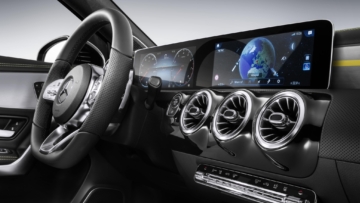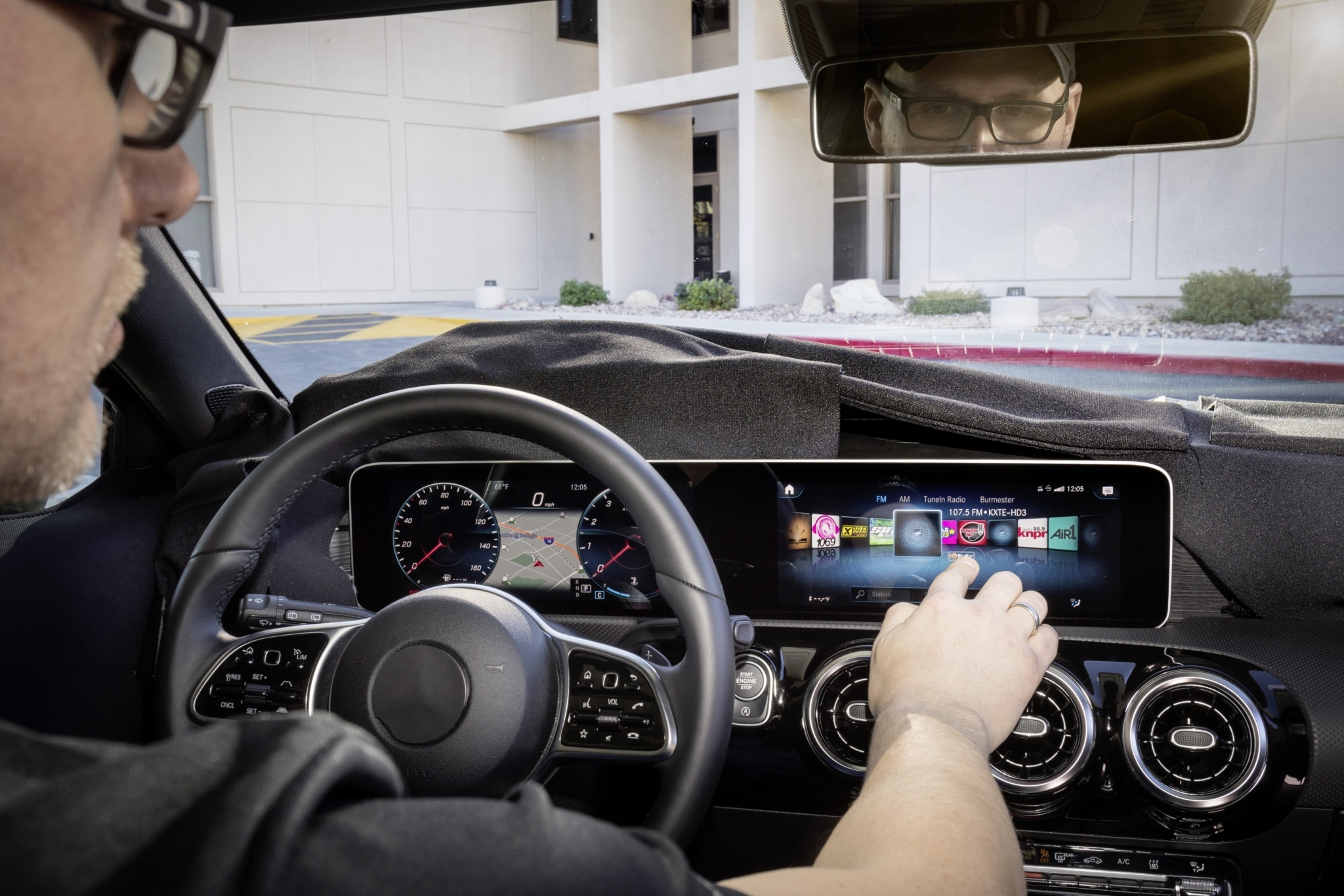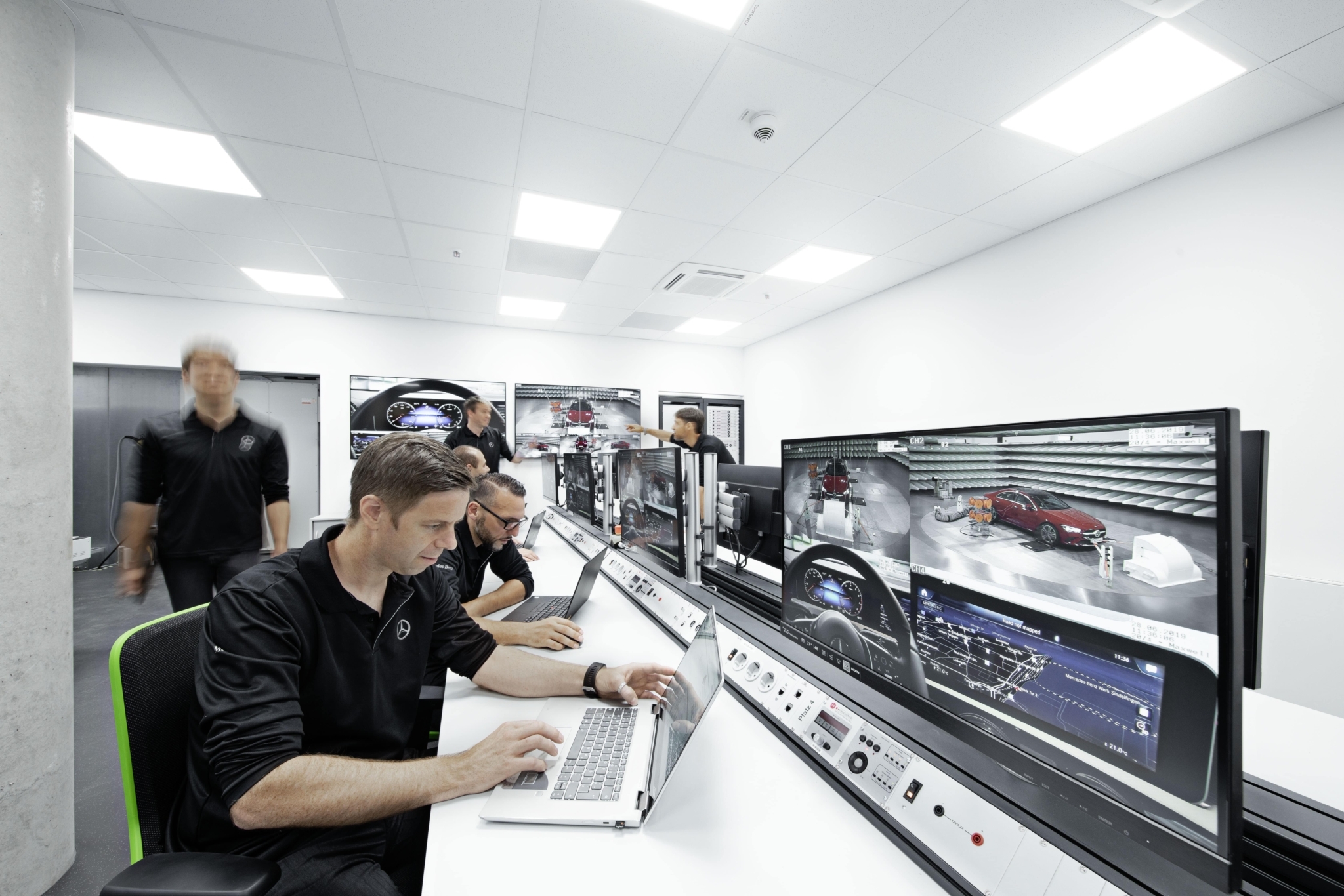Artificial Intelligence: How Mercedes-Benz Helps Create a Better Future

Artificial intelligence or “AI” for short: these two letters symbolize a world of technological possibilities that seemed inconceivable only a few years ago. AI is no longer just a secret code among techies. It has quite literally taken up residence in our living rooms through connected home appliances, as well as in our offices, where intelligent systems in smartphones and e-mail boxes serve as our virtual assistants.
Artificial intelligence or “AI” for short: these two letters symbolize a world of technological possibilities that seemed inconceivable only a few years ago. AI is no longer just a secret code among techies. It has quite literally taken up residence in our living rooms through connected home appliances, as well as in our offices, where intelligent systems in smartphones and e-mail boxes serve as our virtual assistants.
Artificial intelligence or “AI” for short: these two letters symbolize a world of technological possibilities that seemed inconceivable only a few years ago. AI is no longer just a secret code among techies. It has quite literally taken up residence in our living rooms through connected home appliances, as well as in our offices, where intelligent systems in smartphones and e-mail boxes serve as our virtual assistants. And it has also become an integral part of our vehicles. Our cars are now equipped with interlinked navigation systems and smart voice assistants. AI systems help us to maintain a safe distance from other vehicles and stay in our lane. And there is of course the perspective of autonomous mobility.
Mercedes-Benz, too, is looking into the opportunities that AI applications provide, developing new functions for future vehicles and mobility services with the help of machine learning. At Mercedes-Benz Group, AI algorithm specialists, function developers, psychologists, designers, and lawyers are all working on shaping the future of mobility.

Machine Learning and Big Data: Exciting New Possibilities
Today, Mercedes-Benz engineers have managed to massively shorten the development cycle of a vehicle by building a so-called “digital twin,” which consists of digital simulations that make any hardware building superfluous. This is just one of many reasons why Chief Information Officer Jan Brecht says that artificial intelligence, and IT in general, are “the next big thing” at Mercedes-Benz.
But what is AI exactly? “Basically, it is mathematics,” explains Steven Peters, Head of the Artificial Intelligence Research team at Mercedes-Benz Group. AI is not new, but in recent years it has become front and center in our life and work thanks to the breathtaking pace of advances in machine learning. Through digitalization, much more data is available than ever before. Automobiles are now equipped with hundreds of digital sensors that record information about how they operate and perform during every single journey. In addition, computers have become even more powerful and are now capable of analyzing and evaluating immense amounts of data to recognize very complex patterns in a highly automated manner.
“As algorithm experts, we try to discover crucial patterns in driving and car use situations as well as in components and test data,” says Peters. Once he and his team have found these patterns, they work together with function developers, psychologists, designers, and other experts to improve existing functions or create new ones. “If customers repeatedly use a function in a certain way, we can study these patterns to develop a system. The next time the function is required, the system can predict its use and adjust itself automatically.” This can then help improve, say, the heated seat system. Another exciting research topic in the field of machine learning is the possibility to assess the emotions of vehicle occupants. That would enable developers to adjust and optimize the entertainment and relaxation programs to the car occupants’ preferences.

Producing More Comfortable, Powerful, and Safe Cars
At Mercedes-Benz, artificial intelligence already has a variety of applications. With his Data Insights team, Thomas Albin develops tools for the vehicle engineers so they can better harness the potential of this huge amount of data and create Mercedes-Benz vehicles that are even more comfortable, powerful, and safe. Vincent Dekker and his Data Analytics and AI Powertrain team develop data-based solutions to further improve production processes and make Mercedes-Benz’s vehicles and services even better. One of their projects involves quality management. “We keep production data records for every single part installed in our vehicles, over the entire service life of the vehicle. We can use algorithms to restructure these data in a way that enables a more in-depth error analysis,” Dekker explains. “If there were complaints about a certain component during quality control and it turns out all these components have passed through machine X in plant Y, then engineers in production can search for the source of the error much more efficiently and rectify it.”
But AI is also used extensively in the field of “soft skills” such as communication. Lead Data Scientist Pascal Ruck and his colleagues use innovative solutions to ensure that online marketing is tailored even better to customers’ specific needs. “Our main goal is to give our customers the exact information they want,” comments Ruck. “We are all familiar with the annoying experience of switching on our smartphone and seeing three or four marketing emails that don’t interest us. At Mercedes-Benz, we want marketing to be as personal as a visit to the dealership.” One of Ruck’s team’s current projects is the optimization of the vehicle configurator, which customer service representatives use on a tablet at the dealership when they interact with customers.
Machine learning is also used in more unexpected parts of the company, such as administrative functions looking to optimize their procedures. Julian Merten is head of the Data Science team at the Data & Analytics department in Finance & Controlling. The team helps find specific structures and relationships in the data so that the controllers can better predict financial processes, such as the estimation of the “vehicle residual values” in different countries. “This is something that colleagues at Mercedes-Benz have been carrying out in the past, but machine learning can teach computers to reveal interconnections that humans can’t recognize,” Merten explains.
With artificial intelligence, we will interact with our car intuitively in the future. Even small talk will be possible.
Driving with AI: the New Luxury
One particularly exciting domain of artificial intelligence is driver-vehicle communication. How will we communicate and interact with our vehicles in the future? “The potential here is huge,” says Teresa Botschen from the Mercedes-Benz AI Research Team. “With artificial intelligence, we will interact with our car intuitively in the future. Even small talk will be possible.” She teaches cars to understand human language better. A major challenge for machines is the ambiguity of our language. But she is convinced that in the future cars will become more proactive. “When you give your automated vehicle the order, ‘Drive me to Stuttgart’, the system will recognize who is currently on board and make individual suggestions for the itinerary,” Teresa explains. “For example, you get into the car early in the morning, carrying your laptop bag. The algorithm deduces that you are on your way to work and offers you a stop at your favorite bakery. And if you board the car with your family in the afternoon, the system might suggest a stopover at a nice area with a playground.”
Trust: Four Principles on How Mercedes-Benz Uses AI
What is clear in all this is that the basic requirement for widespread acceptance of artificial intelligence is … trust. Early intelligent systems, such as chatbots using offensive language, have been the target of criticism, showing that the use of AI requires clear guidelines. Mercedes-Benz was the first automobile manufacturer to establish a set of principles that serve as the touchstone for the development and deployment of artificial intelligence within its product range.
The first principle is to always use AI responsibly. For Mercedes-Benz, artificial intelligence is always a means, not a purpose. To make sure that all its AI systems have genuine benefits, they first undergo a thorough evaluation process. Will they make the products, services, and processes more efficient? What are the advantages for the different target groups? Do they enhance fairness and inclusion? Further, Mercedes-Benz wants the AI it integrates to be explainable. For example, software that analyzes huge quantities of data to make predictions must always have analysis parameters that are obvious to everyone. The third principle is the protection of privacy. Digital services have now become a permanent and pervasive fixture of our daily lives. It is important that when these services use private data, the privacy of our customers and employees remains protected. Mercedes-Benz considers data protection as one of its quality features. For instance, in the MBUX multimedia system, personal information is processed exclusively inside the vehicle. Finally, Mercedes-Benz takes adequate measures to develop safe and reliable artificial intelligence. Safety and reliability have always been quintessential parts of the brand experience. This fourth principle is also the most important: we can’t forget that in autonomous vehicles, the safety of passengers is determined by reliable AI.

Latest insights & stories

ROAD SAFETY
Since 2018, the number of traffic casualties in Flanders has risen again. Currently, the figures are stagnating, but the risk of accidents with injuries remains high for vulnerable road users in Flanders. And that while traffic should be safe for all users and modes. We want to change this by focusing on transparent policy, training on safe behavior, infrastructure improvements, legislation and enforcement.

What is needed for a more circular construction sector? Insights from Sien Cornillie, Circularity expert at NAV
NAV, or "Netwerk Architecten Vlaanderen," is a professional organisation for architects in Flanders. It offers various services including professional development and advocacy for the architectural sector. NAV also fosters networking opportunities and provides advice on legal, technical, and management aspects. The network is currently working on a position paper on circularity. We sat down with Sien Cornillie, an expert on circularity and energy at NAV. This interview reflects her own opinion.

A Global Movement: The World Unites in a Pink Pledge for Clean and Sustainable Water
5,000 participants. 32 countries. €30,000 funds raised. And that's just the beginning.
Picture this: One step that sends ripples across the globe, transforming lives and creating waves of change. You might wonder, how can such a simple action for most of us have such a profound impact?